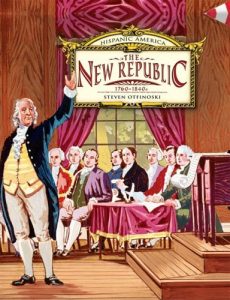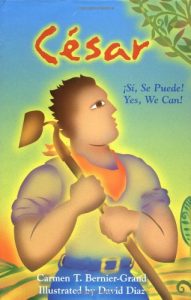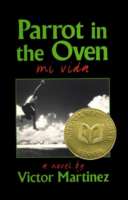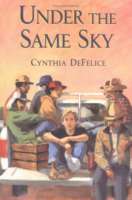 Provides comprehensive information on the history of the Spanish exploring the United States from the American Revolution to the Mexican Revolution.
Provides comprehensive information on the history of the Spanish exploring the United States from the American Revolution to the Mexican Revolution.
Latinx in US
F Is For Fiesta
From adornos (decorations) going up all over the house, biscochitos (cupcakes) baking in the oven, and a special treat of churros (doughnut sticks) for breakfast, this can only be the beginning of a fabulous cumpleaños (birthday)! As the alphabet continues, the story highlights fun elements of a boy’s never-ending birthday celebration, including entries for ch, ll, ñ, and rr that make this a truly Latino ABC fiesta.
Clever verse and exuberant illustrations make the meaning of each Spanish word clear, and an author’s note explains the difference between the English and Spanish alphabets.
Three Little Tamales
While three little tamales cool off on a windowsill, a tortilla rolls by. “You’ll be eaten. You’d better run,” he tells them. And so the tamales jump out the window. The first runs to the prairie and builds a house of sagebrush. The second runs to a cornfield and builds a house of cornstalks. The third runs to the desert and builds a house of cactus. Then who should come along but Senior Lobo, the Big Bad Wolf, with plans to blow their houses down. Valeria Docampo’s oil-and-pencil illustrations add zest and humor to this rollicking southwestern version of a popular tale.
Sofi Mendoza’s Guide to Getting Lost in Mexico

When Southern California high school senior Sofi Mendoza lies to her parents and crosses the border for a weekend party, she has no idea that she will get stuck in a Mexican village with family she has never met before, unable to return to the United States and the easy life she knew.
¿de Veras?

For one month each year, the National Hispanic Cultural Center in Albuquerque brings together New Mexico teens for a creative writing program that immerses them in a process of reflection and creativity while encouraging them to explore their identity as people, as a culture, as a region, and as a society. These students unite their varied experiences, backgrounds, and beliefs to form a supportive community of respect through conversation and writing.¿de Veras? (really?) features a collection of poems, essays, and stories written in the Voces program between 2002 and 2006 that represent the diversity of perspectives and individuality of voices of the young creators. These writings reflect the authors’ courage to examine their lives, their neighborhoods, their families, and their cultures. What emerges is their amazingly perceptive, sometimes damning, yet always-honest insights.
Ce´sar
 Born in 1927 in Yuma, Arizona, César Chavez lived the hard-scrabble life of a migrant worker during the depression. He grew to be a charismatic leader and founded the National Farm Workers Association, an organization that fought for basic rights for his fellow farm workers. In powerful poems and dramatic stylized illustrations, Carmen T. Bernier-Grand and David Díaz pay tribute to his life and legacy.
Born in 1927 in Yuma, Arizona, César Chavez lived the hard-scrabble life of a migrant worker during the depression. He grew to be a charismatic leader and founded the National Farm Workers Association, an organization that fought for basic rights for his fellow farm workers. In powerful poems and dramatic stylized illustrations, Carmen T. Bernier-Grand and David Díaz pay tribute to his life and legacy.
Parrot in the Oven: Mi Vida

Manny relates his coming of age experiences as a member of a poor Mexican American family in which the alcoholic father only adds to everyone’s struggle.
Featured in Volume VI, Issue 1 of WOW Review.
Return to Sender

After his family hires migrant Mexican workers to help save their Vermont farm from foreclosure, eleven-year-old Tyler befriends the oldest daughter, but when he discovers they may not be in the country legally, he realizes that real friendship knows no borders.
Featured in WOW Review Volume XI, Issue 3
Under The Same Sky

A teenager discovers racism and romance on his father’s farm. For his fourteenth birthday, Joe Pedersen wants a motorbike that costs nearly a thousand dollars. But his mom says the usual birthday gift is fifty dollars, and his dad wants Joe to earn the rest of the money himself and “find out what a real day’s work feels like.” Angry that his father doesn’t think he’s up to the job, Joe joins the Mexican laborers who come to his father’s farm each summer. Manuel, the crew boss, is only sixteen, yet highly regarded by the other workers and the Pedersen family. Joe’s resentment grows when his father treats Manuel as an equal. Compared with Manuel, Joe knows nothing about planting and hoeing cabbage and picking strawberries. But he toughs out the long, grueling days in the hot sun, determined not only to make money but to gain the respect of his stern, hardworking father. Joe soon learns about the problems and fears the Mexicans live with every day, and, before long, thanks to Manuel, his beautiful cousin Luisa, and the rest of the crew, Joe comes to see the world in a whole different way.In her sensitive new novel, Cynthia DeFelice explores our dependency on migrant workers and simultaneous reluctance to let these people into our country and into our lives.
The Lady In The Blue Cloak: Legends From The Texas Missions
 For each Texas mission, there is a rich and complicated history. In the title story, from Mision de San Francisco de los Tejas, a mysterious woman in blue visits the Teas people to prepare them for the missionaries\’ arrival. In \”Rosa\’s Window\” and \”The Bell\” the love and grief of two couples torn apart in the making of the Mision de San Jose y San Miguel de Aguayo manifest themselves in the very edifices of the mission. The Mision de Nuestra SEnora de la Purisma Concepcion de Acuna, named for and dedicated to the Blessed Virgin Mary, was the scene of a remarkable salvation as the Teas workers tried to escape the heated pursuit of the Comanches in \”The Miracle at the Gate.\” Here Kimmel gracefully retells these and other powerful legends behind four of th missions, each enhanced by a beautifully evocative painting by Susan Guevara.
For each Texas mission, there is a rich and complicated history. In the title story, from Mision de San Francisco de los Tejas, a mysterious woman in blue visits the Teas people to prepare them for the missionaries\’ arrival. In \”Rosa\’s Window\” and \”The Bell\” the love and grief of two couples torn apart in the making of the Mision de San Jose y San Miguel de Aguayo manifest themselves in the very edifices of the mission. The Mision de Nuestra SEnora de la Purisma Concepcion de Acuna, named for and dedicated to the Blessed Virgin Mary, was the scene of a remarkable salvation as the Teas workers tried to escape the heated pursuit of the Comanches in \”The Miracle at the Gate.\” Here Kimmel gracefully retells these and other powerful legends behind four of th missions, each enhanced by a beautifully evocative painting by Susan Guevara.
